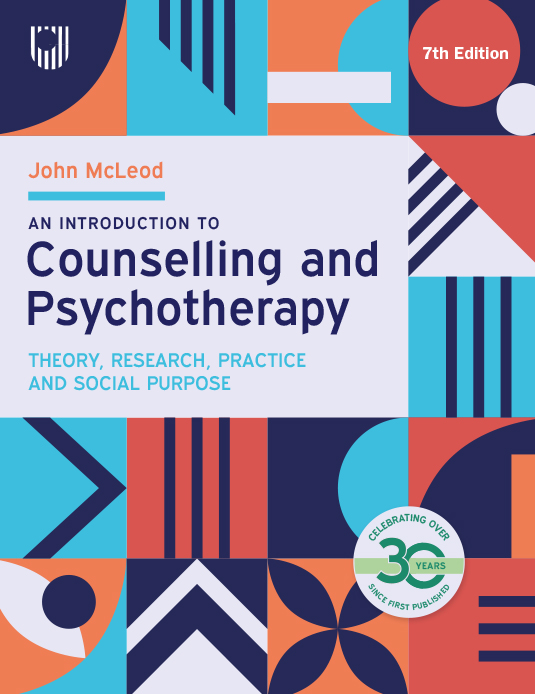We are pleased to offer an Online Learning Centre to accompany An Introduction to Counselling & Psychotherapy: Theory Research, Practice and Social Purpose, 7th edition by John McLeod.
In this online resource, readers will find a plethora of learning resources, further questions for reflection and discussion and extended chapter reference lists.
Further content will be added to the OLC over the course of the coming months, please check back here for updates.
Contents of this OLC
- Using research to inform practice
- The process of therapy Professional and ethical issues
- Approaches to therapy
- Socio-political, cultural and historical aspects of practice
- Conceptual issues in therapy
Further Questions for Reflection and Discussion
- Chapters 1-3
Extended Chapter Reference Lists
- History
- Research
- Decolonising and anti-racism
- Suicide
- Climate crisis and ecological collapse
- Cultural perspectives on therapy
- Ethics
- Gender
Table of Contents
- How to use this book
- Introduction
- Part 1. The common ground
- Chapter 1. What its like to be a client
- Chapter 2. What its like to be a therapist
- Chapter 3. Working together: the relationship between the client and therapist
- Chapter 4. Therapy as a process
- Chapter 5. The beginning
- Chapter 6. Leaving therapy
- Part 2. Conceptualising the practice of therapy
- Chapter 7. The psychodynamic tradition
- Chapter 8. The cognitive-behavioural perspective
- Chapter 9. Interpersonal therapies
- Chapter 10. Person-centred, humanistic and experiential approaches
- Chapter 11. Transaction Analysis: a comprehensive theoretical system
- Chapter 12. Gestalt Therapy
- Chapter 13. Existential therapies
- Chapter 14. Narrative Therapy
- Chapter 15. Working with families
- Chapter 16. The use of art in therapy
- Chapter 17. Therapy in nature: using the outdoor environment
- Chapter 18. The use of technology in therapy
- Chapter 19. Religion and spirituality
- Chapter 20. Embodied conversations
- Chapter 21. Integrative therapies
- Chapter 22. Pluralistic therapy
- Part 3. How therapy can contribute to building a better world
- Chapter 23. The historical context of contemporary practice
- Chapter 24. A cultural perspective on therapy
- Chapter 25. A social adversity perspective
- Chapter 26. A social justice approach to therapy
- Chapter 27. Decolonising therapy
- Chapter 28. Racialisation and antiracism
- Chapter 29. Supporting clients to overcome gender-based oppression
- Chapter 30. Climate change and ecological collapse
- Part 4. Being a therapist
- Chapter 31. Qualities of effective therapists
- Chapter 32. Professional structures for developing and maintaining therapist competence
- Chapter 33. Working within an ethical and moral framework
- Chapter 34. Using research to inform practice
- Chapter 35. A life worth living: suicide and the social purpose of counselling and psychotherapy
- References
- Index
About this Book
John McLeod’s accessible bestseller provides a comprehensive, research-informed overview of the theory and practice of counselling and psychotherapy. Now in its seventh edition, this leading introduction to the discipline has been expanded to include a renewed focus on social justice, the use of technology in therapy, non-Western traditions, socio-political and decolonising perspectives, and working with clients who are considering taking their own lives.
The book retains its comprehensive coverage of both mainstream and emerging approaches to therapy, and professional issues such as supervision, training, therapist development, ethical standards and research-informed practice. New to this edition is wider coverage of issues such as racism, the climate crisis, gender and sexuality; debates around neuroscience, spirituality and integrative approaches to therapy; and third-wave transdiagnostic cognitive-behavioural therapies such as ACT, mindfulness and FAP. Fully revised and updated throughout, the seventh edition also contains:
- Access to complementary online resources
- Case studies
- Landmark and contemporary research studies
- Critical analysis of the cultural, historical and social context of therapeutic approaches
- Reflection and discussion topics
- Suggestions for further reading
This book equips readers with the confidence to navigate and apply a range of therapeutic models. Building on the author’s extensive research and professional experience, the 7th edition of An Introduction to Counselling and Psychotherapy remains the definitive guide for students and practitioners.
Praise for the Book
“I urge you to buy this book… One of the best overviews of the philosophy, principles, theories, research and practices of therapy that I have ever read... This book should be read by both beginning and fully qualified therapists – and importantly, by all those involved in designing and delivering training programmes for counsellors and psychotherapists.”
Professor Charlotte Sills, Ashridge Business School, Metanoia Institute, UK
“If you have been searching for a contemporary book that offers a comprehensive overview of counselling and psychotherapy in straightforward manner whilst also engaging with underlying debates and research evidence, then you have just found it! I highly recommend this book for every counselling and psychotherapy trainee and for seasoned practitioners alike.”
Dr Divine Charura, Professor of Counselling Psychology, York St John University, UK
“The brilliance of a book such as this one, a uniqueness which sits alongside its longevity and numerous editions, is that McLeod’s work recognises that counselling and psychotherapy, that the work we do with the wide range of clients we meet, is a constantly growing field…A brilliantly worthy addition to this ever-expanding universe which is our profession.”
Dr Dwight Turner, Course Leader, Humanistic Counselling and Psychotherapy, University of Brighton, UK


Feedback for this OLC
If you have any feedback on this resource or specific requests for content in the interim, please contact hannah.jones2@mheducation.com
Order your Copy
If you are an instructor considering adopting this book for your course, you can order your inspection copy here by pressing 'Request Review Copy'; if you are a student, or indeed, anyone else interested in the book, you can buy a copy in print or eBook from here.


